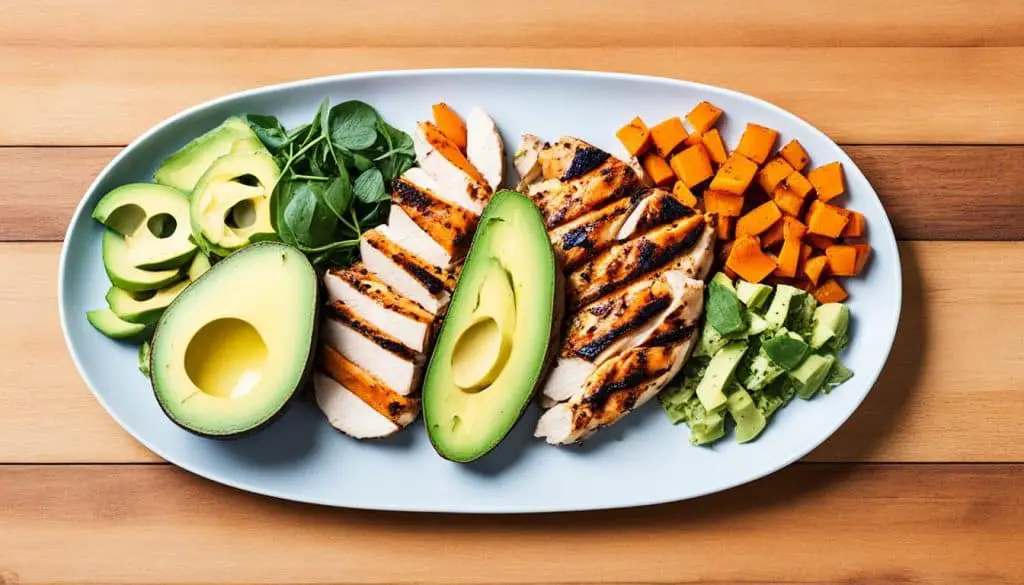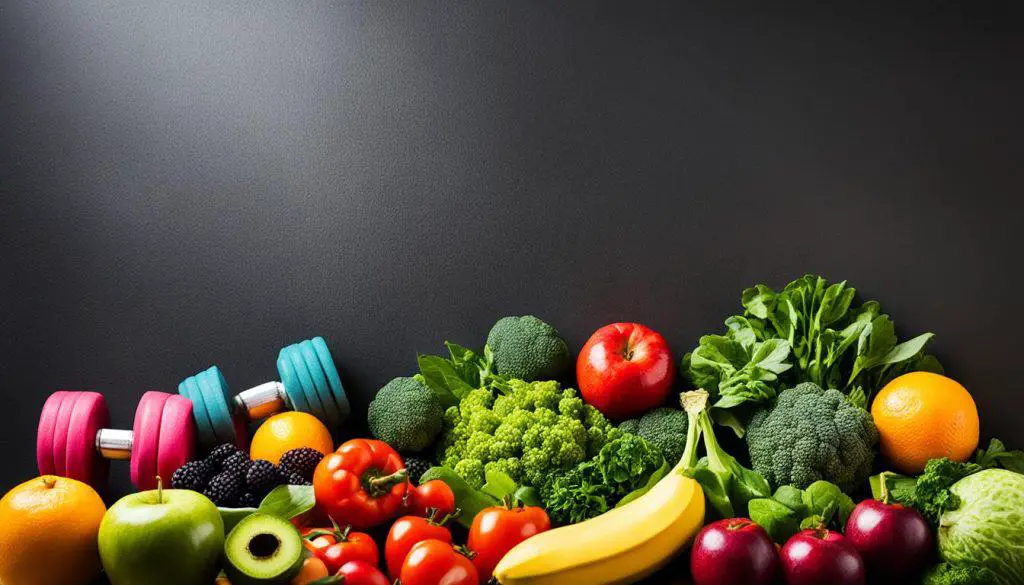
Proper nutrition is essential for maximizing the benefits of a high-intensity interval training (HIIT) workout. HIIT involves short, intense bursts of exercise followed by brief recovery periods. It has been shown to be effective for fat loss and calorie burning. To fuel your body for a HIIT workout, it’s important to consume a healthy mixture of carbohydrates and protein. Carbohydrates provide the energy needed for intense workouts, while protein helps rebuild and repair muscles. It’s also crucial to stay hydrated before, during, and after a HIIT session.
Key Takeaways:
- Proper nutrition is essential for maximizing the benefits of a HIIT workout.
- Consume a mixture of carbohydrates and protein before a HIIT workout to fuel your body.
- Stay hydrated before, during, and after your HIIT session.
- Carbohydrates provide energy, while protein helps rebuild and repair muscles.
- Experiment with different meal and snack options to find what works best for you.
Pre-Workout Nutrition for HIIT
Before engaging in a high-intensity interval training (HIIT) session, it’s crucial to fuel your body with the right combination of carbohydrates and protein. This will provide you with the energy and nutrients necessary to perform at your best and optimize your workout results.
When it comes to carbohydrates, you should focus on consuming a mix of complex and simple options. Complex carbohydrates, like slow-cooked oatmeal and whole wheat bread, provide sustained energy throughout your workout. On the other hand, simple carbohydrates, such as fruits and fruit juices, offer quick energy to boost your performance.
Protein is equally important for HIIT workouts as it aids in muscle repair and recovery. Incorporate protein-rich foods like eggs, fish, turkey, and plant-based options like hemp seeds into your pre-workout meal or snack. These sources of protein will support your muscles during the intense bursts of exercise.
It’s essential to consider the timing of your pre-workout meal. Aim to eat at least two hours before your HIIT workout to allow for proper digestion and energy utilization. If you’re short on time, opt for a smaller meal or snack that contains simple carbohydrates for quick digestion.
In addition to proper nutrition, hydration should never be overlooked. Stay hydrated throughout the day and make sure to drink enough water before your workout to keep your energy levels up.
The Best Foods for HIIT Workout:
- Slow-cooked oatmeal
- Whole wheat bread
- Fruits
- Fruit juices
- Eggs
- Fish
- Turkey
- Hemp seeds
Remember, the right combination of carbohydrates and protein, along with proper hydration, will help you perform at your peak during HIIT workouts.
| Pre-Workout Meal Example: | Pre-Workout Snack Example: |
|---|---|
|
|

Post-Workout Nutrition for HIIT
After a HIIT workout, it’s crucial to prioritize your recovery by refueling your body with the right nutrients. A well-balanced post-workout meal or snack consisting of carbohydrates and protein is essential for replenishing energy stores and supporting muscle repair and growth.
Carbohydrates play a vital role in restoring glycogen levels in your muscles, which get depleted during intense exercise. By consuming complex carbohydrates, such as whole grain bread, brown rice, or sweet potatoes, you provide your body with a steady release of energy that helps in recovery. Pair these with lean sources of protein, like grilled chicken, tofu, or Greek yogurt, to aid in muscle repair and growth.
It’s recommended to aim for a 3-to-1 carbohydrate-to-protein ratio in your post-workout meal. This balance ensures that your body receives the necessary nutrients for optimal recovery. Here are some healthy meal ideas:
- Grilled chicken breast with quinoa and roasted vegetables
- Salmon with brown rice and steamed broccoli
- Whole wheat pasta with lean ground turkey and marinara sauce
If you prefer a snack instead of a full meal, consider options like a protein shake made with a high-quality protein powder, a banana with almond butter, or a handful of mixed nuts and seeds. These snacks provide quick and convenient sources of carbohydrates and protein to kickstart your recovery process.
Time is of the Essence
As important as the composition of your post-workout meal is, timing is also crucial. It’s recommended to consume your post-workout meal or snack within 15 to 20 minutes after completing your HIIT workout. This window of time, often referred to as the “anabolic window,” is when your body is most receptive to nutrient absorption and utilization for recovery.
By fueling your body with the right nutrition during this window, you can optimize muscle recovery and minimize muscle breakdown. Additionally, don’t forget to hydrate properly by drinking enough fluids and replacing electrolytes lost through sweat. Water, coconut water, or a sports drink can help replenish your hydration levels.
Remember that post-workout nutrition plays a crucial role in your HIIT training journey. By providing your body with the necessary nutrients, you promote faster recovery, enhance athletic performance, and support overall fitness gains.

Timing and Individual Variation in HIIT Nutrition
The timing of your meals and snacks before and after a HIIT workout can vary based on individual preferences and goals. It’s important to listen to your body and experiment with what works best for you.
Some individuals may prefer a small snack or meal an hour before their workout, while others may need more time to digest a larger meal. The same applies to post-workout nutrition; some individuals may benefit from consuming a meal immediately after their workout, while others may have a slightly longer window.
Remember that every person is different, and finding the right foods, portion sizes, and timing for your body and goals is vital.
Experiment with different meal and snack options, and pay attention to how your body responds. Remember that nutrition is a key component of your HIIT training journey, and finding the right balance for your body is essential for achieving your fitness goals.
Recommended Timing for HIIT Nutrition:
- 1-2 hours before a HIIT workout: consume a balanced meal containing carbohydrates and protein for sustained energy.
- 30-60 minutes before a HIIT workout: opt for a small snack that is rich in simple carbohydrates for quick digestion.
- Immediately after a HIIT workout: aim to have a post-workout meal or snack within 15 to 20 minutes for optimal muscle recovery.
- 1-2 hours after a HIIT workout: continue to replenish your energy stores with a balanced meal containing carbohydrates and protein.
Conclusion
Proper nutrition is a crucial factor in maximizing the benefits of your HIIT workout. By fueling your body with a balanced combination of carbohydrates and protein before and after your session, you can optimize your energy levels, support muscle repair and growth, and enhance overall performance.
It’s important to stay hydrated and listen to your body’s individual needs and preferences. Experiment with different meal and snack options to find what works best for you. Pay attention to how your body responds to different foods and adjust accordingly.
Remember that nutrition is a key component of your HIIT training journey. Finding the right balance for your body is essential for achieving your fitness goals. So, take the time to fuel your workouts properly and reap the rewards of your hard work.
FAQ
What should I eat before a HIIT workout?
It is recommended to consume a meal or snack that is a combination of carbohydrates and protein. Complex carbohydrates, such as slow-cooked oatmeal and whole wheat bread, provide sustained energy, while simple carbohydrates like fruit and fruit juice provide quick energy. Good sources of protein include eggs, fish, turkey, and plant-based options like hemp seeds.
How long before a HIIT workout should I eat?
It is best to eat at least two hours before a workout to allow for proper digestion. However, if you have limited time, opt for a smaller meal or snack containing simple carbohydrates for quick digestion. Regardless, staying hydrated by drinking enough water throughout the day and before your workout is crucial.
What should I eat after a HIIT workout?
After a HIIT workout, it’s important to replenish your energy stores and aid in muscle recovery. A post-workout meal or snack should consist of carbohydrates and protein. Some options include turkey on whole grain bread, low-fat chocolate milk, and hummus with sliced veggies and pita bread. Aim for a 3-to-1 carbohydrate-to-protein ratio in your post-workout meal.
When should I eat after a HIIT workout?
It is crucial to consume your post-workout meal within 15 to 20 minutes after your workout for optimal muscle recovery. This timing allows for the effective restoration of glycogen levels in the muscles and supports muscle repair and growth. Additionally, make sure to drink enough fluids and replenish lost electrolytes to stay hydrated.
How do I determine the timing of my meals before and after a HIIT workout?
The timing of your meals and snacks can vary based on individual preferences and goals. It’s important to listen to your body and experiment with what works best for you. Some individuals may prefer a small snack or meal an hour before their workout, while others may need more time to digest a larger meal. The same applies to post-workout nutrition; some individuals may benefit from consuming a meal immediately after their workout, while others may have a slightly longer window.
Why is proper nutrition important for HIIT workouts?
Proper nutrition plays a crucial role in maximizing the benefits of a HIIT workout. By fueling your body with the right combination of carbohydrates and protein before and after your workout, you can optimize energy levels, support muscle repair and growth, and enhance overall performance. Additionally, staying hydrated and listening to your body’s individual needs and preferences are essential for achieving your fitness goals through HIIT training.
Source Links
- https://www.issaonline.com/blog/post/what-to-eat-before-high-intensity-interval-training
- https://www.everydayhealth.com/fitness/what-eat-before-after-your-workout/
- https://www.lifefitness.com/en-us/blog/high-intensity-interval-training-hiit-energy-tips
Hey there, I’m Luke, and I’ve been immersed in the fitness world since 2007. From gym floors to running my own personal training business, I’ve seen it all. My journey led me to study Sports Science at university, where I deepened my understanding of the science behind exercise.
One thing that truly lights my fire? High-Intensity Interval Training (HIIT). It’s not just a workout; it’s a game-changer. I’ve used HIIT to help countless men and women shed weight and transform their lives for the better.
Through my personal training business, I’ve witnessed the incredible impact of HIIT on both physical and mental well-being. It’s not just about getting fitter; it’s about feeling stronger, more confident, and more resilient.
Join me on this journey to a healthier, happier you. Let’s crush those goals together!